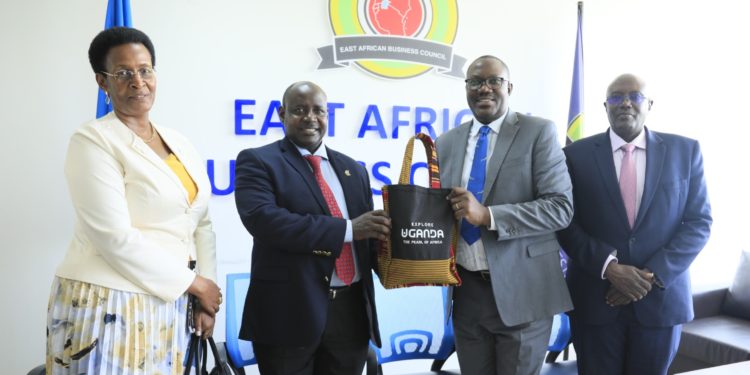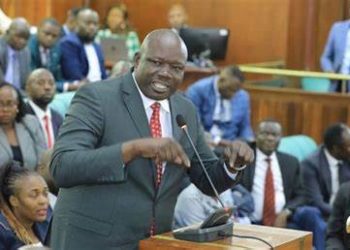By CHIMPREPORTS
Uganda’s Permanent Secretary of Foreign Affairs, Vincent Bagiire, emphasized the importance of intra-East African Community (EAC) trade and collaboration among partner states to consolidate exports to both the African Continental Free Trade Area (AfCFTA) and the European Union (EU).
Bagiire highlighted that shared resources, such as Lake Victoria, provide abundant opportunities for export collaboration and aggregation.
Speaking on Thursday during high-level talks between Ugandan officials and the East African Business Council (EABC) in Arusha, Tanzania, the Permanent Secretary aimed to strengthen regional trade and economic cooperation.
The discussions covered various areas, including the analysis of non-tariff barriers, private sector proposals for Joint Permanent Commission Meetings, statistics, the rollout of the AfCFTA strategy, and the role of peace in facilitating trade.
Bagiire was accompanied by Amb. Richard Kabonero, the Director of Regional Economic Cooperation, and Amb. Anne Katusiime Kageye, Head of the Uganda Consulate in Arusha, at the EABC headquarters in Arusha.
According to the EAC Secretariat’s statistics, the region’s total trade value with the rest of the world (ROW) in the third quarter of 2023 (July to September 2023) was US$ 21.0 billion, representing a one percent decline compared to US$ 21.2 billion in the same quarter of 2022.
During the review period, four EAC Partner States (Tanzania, Kenya, Uganda, and South Sudan) were among the top twenty trading partners, engaging in trade worth US$ 2.5 billion, equivalent to 11.8 percent of the total trade.

According to the latest statistics released by Uganda’s Ministry of Finance, the East African Community (EAC) maintained its status as the primary destination for Uganda’s exports in December 2023, capturing a 37.6% share of the total market.
Bagiire also highlighted the positive strides made by EAC partner states in advancing the One Network Area in telecommunication for both voice and data.
“Improving the interoperability of telecommunication services for mobile money transfer will facilitate business operations across borders as the region looks forward to the monetary union in 2031,” he observed.
John Bosco Kalisa, the Executive Director of EABC, reiterated the Council’s unwavering commitment to amplifying trade for enhanced prosperity in East Africa.
He emphasized the paramount role of public-private partnerships in propelling socio-economic growth, underscoring the private sector as the driving force behind regional development.
“We appreciate the Ministry of Foreign Affairs Uganda for its collaboration in the East African Business Summit 2023 and the 19th NAM Summit Business Summit 2024,” said Kalisa.
“The EAC is the fastest-growing economic bloc, and EABC remains resolute in advocating for the elimination of non-tariff barriers to expedite EAC integration amidst geopolitical tensions.”
On Wednesday, Bagiire, Kabonero, and Katusiime held discussions with the East African Community (EAC) Secretary-General Peter Mathuki in Arusha. The meeting covered various aspects, including infrastructure development, energy, cross-boundary matters, shared natural resources, intra-regional trade, single currency, peace and security, and political federation.







Discussion about this post